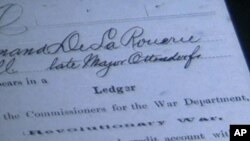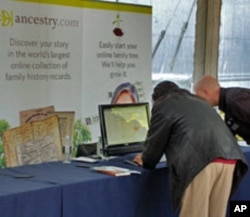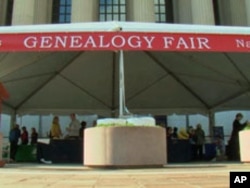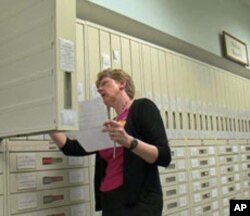The U.S. government is conducting its census this year. The count takes place every 10 years to determine how many seats each state will have in the House of Representatives. But in 72 years, when the 2010 census becomes public, it's very likely that average Americans will use the information to search for their family roots.
A popular hobby
For two days in April, more than 2,000 people came to the National Archives for the Sixth Annual Genealogy Fair, a free event with dozens of experts offering advice to Americans researching their family history.
"We get more people every year," says Constance Potter. An archivist who specializes in documents of interest to genealogists, Potter says the first genealogy fair attracted about 500 people. Last year, there were 1,500.
It was the fifth genealogy fair for Shirley Jones. "You want to know where you came from, who (were) your parents, who your forefathers were. I wanted to know where I came from."
Lisa Roy says having children got her interested in genealogy. "When they were born, especially my oldest, I thought I really want my kids to understand their heritage. I knew some of it, but it has been interesting to do the background on it."
TV launches a craze
Many Americans began to search for their ancestors after seeing the 1977 TV program Roots, which dramatized author Alex Haley's family history, from Africa, through slavery in America, to freedom.
"That was the first thing that created "roots" mania in America," says professional genealogist Megan Smolenyak. "Now we're experiencing a whole new wave, a fresh influx."
Smolenyak has researched the family history of President Barack Obama and First Lady Michelle Obama. She is an advisor on two new television series reflecting the renewed interest in genealogy. Both Who Do You Think You Are? and Faces of America explored the family histories of celebrities.
Already a big hit in the United Kingdom, where it originated, Who Do You Think You Are? has been renewed for a second season on American TV.
Smolenyak hopes the new shows will spark some fresh recruits to family history, but she says the current surge of interest has more to do with the internet.
Connecting to the past through the web
"You can get a running start with what is online." She notes that Ancestry.com, one of the paid membership sites researchers can use, has over four billion records. "It's nice, you can sit at home and search in your pjs (pajamas), go through census records and that sort of thing."
Smolenyak, who is chief family historian for Ancestry.com, says people spend millions of hours on that site every month, but you can't find everything online, which is why people often end up at the National Archives.
The Archives has digitized more than 100,000 records, which are available on its website for free, but archivist Constance Potter says, that's just a fraction of the 10 billion it holds. There are not only census records, but military records, passenger lists for immigrants arriving by ship between 1820 and 1959, and naturalization records. For the most part, if a researcher's ancestor hand interaction with the U.S. government, there is likely to be a record of it in the National Archives.
Carol Ann Summer and her friend Bobbie Bold came looking for military records. Bold is looking for records from the U.S. Civil War (1861-1865). Summer is looking through microfilm for documents from the late 18th century, when the United States was becoming a new nation.
"There he is. We found him," she says after scanning a spool of film through a viewer in a darkened room. "I wanted to get that last relative," Summer says, "and that was this one from the Revolutionary War, so I'm tickled. I don't think I can go back any farther with my father's family, but I'll keep trying."
Archivist Constance Potter isn't surprised that Summer isn't ready to give up entirely. She says genealogy can be addictive. "You find one thing out and it can lead to something else. It's like a detective story. It really is. And you just keep adding on the clues." And those clues help researchers understand not only where they came from, but who they are.

















